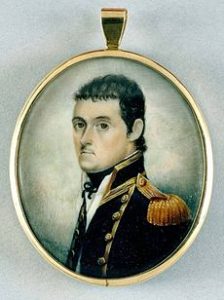 Captain Matthew Flinders RN (16 March 1774 – 19 July 1814) was an English navigator and cartographer, who was the leader of the first circumnavigation of Australia and identified it as a continent.
Captain Matthew Flinders RN (16 March 1774 – 19 July 1814) was an English navigator and cartographer, who was the leader of the first circumnavigation of Australia and identified it as a continent.
Flinders made three voyages to the southern ocean between 1791 and 1810. In the second voyage, George Bass and Flinders confirmed that Van Diemen’s Land (now Tasmania) was an island. In the third voyage, Flinders circumnavigated the mainland of what was to be called Australia, accompanied by Aboriginal man Bungaree.
Heading back to England in 1803, Flinders’ vessel needed urgent repairs at Isle de France (Mauritius). Although Britain and France were at war, Flinders thought the scientific nature of his work would ensure safe passage, but a suspicious governor kept him under arrest for more than six years. In captivity, he recorded details of his voyages for future publication, and put forward his rationale for naming the new continent ‘Australia’, as an umbrella term for New Holland and New South Wales – a suggestion taken up later by Governor Macquarie.
Flinders’ health had suffered, however, and although he reached home in 1810, he did not live to see the publication of his widely praised book and atlas, A Voyage to Terra Australis.

